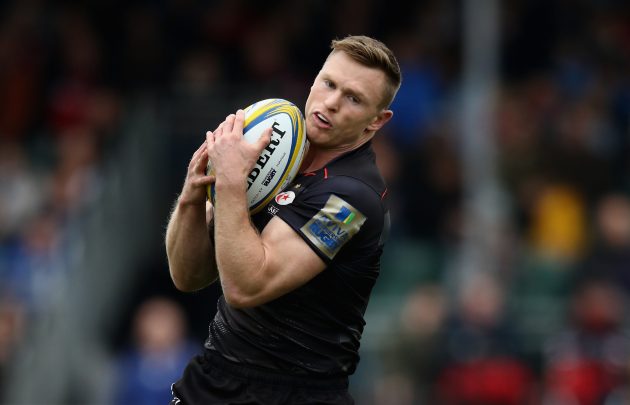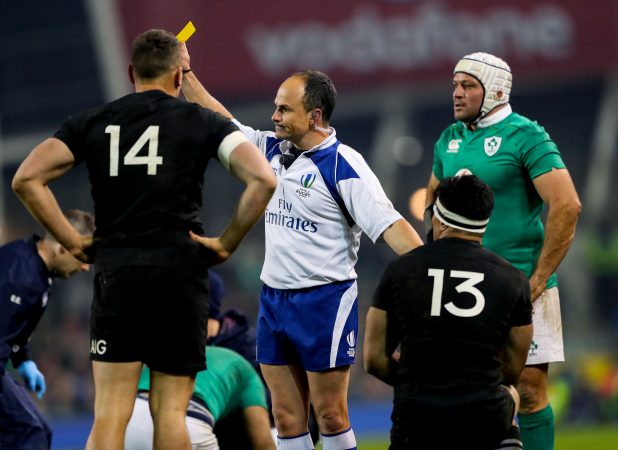With another raft of citings from the weekend, there is a growing cacophony of commentators getting increasingly confused by the inconsistent disciplinary process...
There were plenty of international players in the dock this week but maybe the disciplinary process should be in the dock as well.
Another week of autumn internationals, another round of citings and yet another round of puzzling decisions by the men in blazers when the disciplinary hearings got underway. And before we get going this is not just a rant against the All Blacks who seem to have attracted most of the ire on social media since their win over Ireland in Dublin last Saturday which was probably the most physical game seen this calendar year.

Talking point: Sam Cane’s tackle put Robbie Henshaw out of the game
There were four players up before the beak this week – England’s Joe Launchbury, Argentina’s Nicolas Sanchez and the New Zealand pair Malakai Fekitoa and Sam Cane. They were charged variously with booting an opponent in the head, striking an opponent and a couple of dangerous tackles and got a variety of punishments, some of which were of the head-scratching variety.
Rugby is a hurly-burly game and you can’t expect referees – or journalists, for that matter – to see everything and there was hardly a mention of the first two incidents in the aftermath of the matches. The first most people knew that Launchbury and Sanchez could be in bother came when the disciplinary emails dropped a couple of days later.
But when incidents and the non-sending off of players change the results of games then something needs to be done and if that needs a change in the laws then it needs a change in the laws. Different definitions of a high tackle are being talked about, but that won’t be introduced into the elite game any time soon – maybe they current laws should be refereed properly.

In the dock: Joe Launchbury has been suspended for two weeks
Rugby administrators always have an eye on playing numbers and no-one wants to play a game where you could get decapitated. No mother is going to let her son or daughter get involved in a sport where there is a real danger of getting your block knocked off.
And if someone does something that could take an opponent’s head off the lawmakers should throw the book at them and they should have thrown the book at at least one of the four players last weekend.
But sometimes it seems they chuck a load of balls in the air and see what numbers come down first when deciding the length of bans. There are guidelines but it often seems these are pretty meaningless and there are too many things to be added and taken away from the entry points when they finally come to the conclusion that most blokes are available to play next week.

Head high: Malakai Fekitoa is carded for his high tackle on Simon Zebo
Launchbury was first up and the three-strong disciplinary committee ruled that his kick to the head of Fiji centre Asaeli Tikoirotuma was reckless, but not deliberate, but deserved a red card at the time and gave him a four-week ban. This was reduced to two weeks as Launchbury had held his hands up and pleaded guilty; he was contrite and had a clean record.
Sanchez, the Argentina fly-half, admitted he had struck a Scotland player, as he was trying to get free from an ‘illegal grasp’ but pleaded that it did not merit a red and was not banned at all.
The two New Zealanders, Cane and Fekitoa, had different cases to answer, both involving dangerous tackles that could conceivably have ended in red cards and with no-one getting their marching orders you wonder what World Rugby’s directive earlier this month was all about.

No case to answer: Nicolas Sanchez was exonerated from a striking charge
The governing body told referees to be strict on tackles, charges or kicks that can cause concussion but what happens if they card a player who is then let off on the Tuesday afterwards? They truly do have the impossible job.
World Rugby’s match officials selection committee chairman Anthony Buchanan said: “The laws of the game clearly state that the necks and heads of players are sacrosanct. When it comes to foul play, the game is cleaner now than ever before but referees must constantly be alert to head-high hits.”
Cane’s hit on Robbie Henshaw, in the game against Ireland, which knocked the centre out is a tough one to call, even after looking at the video. He doesn’t seem to make a huge effort to wrap his arms around the Irishman, it does look high and Joe Schmidt’s reaction in the coaches’ box is pretty instructional as Ireland only got a penalty out of it.
But Steve Hansen, the New Zealand head coach, saw it differently, the All Blacks contested the citing and Cane was not banned – although he was injured and out of the next game New Zealand game anyway.

Long ban: Chris Ashton is someone who some feel has been hard done by disciplinary panels
Fekitoa was sinbinned for his tackle on Simon Zebo which was does not getter any better the more you look at on the video. Fekitoa, who should have seen red, came back on after his 10 minutes in the cooler and scored his second try of the game. He should have been nowhere near the pitch and was given a week’s ban at his hearing despite saying he didn’t think his tackle deserved a red. As it was he got a two-week ban, reduced to seven days, when mitigating factors and contrition were taken into account.
Surmising the game, you can be sure that it was not the greatest day at the office for referee Jaco Peyper and his assistants. Fekitoa’s was a blatant high tackle, you can argue the toss about Cane’s challenge but how Launchbury got four times – originally before it was reduced – the ban the New Zealand centre got is baffling. Just ask Chris Ashton. He could tell you a bit about the lottery of suspensions and how long you are going to get.






